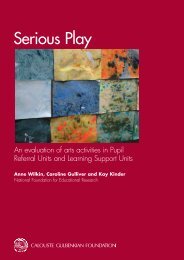Why Restorative Justice? - Calouste Gulbenkian Foundation
Why Restorative Justice? - Calouste Gulbenkian Foundation
Why Restorative Justice? - Calouste Gulbenkian Foundation
You also want an ePaper? Increase the reach of your titles
YUMPU automatically turns print PDFs into web optimized ePapers that Google loves.
WHAT CHOICES ARE THERE?<br />
Susan<br />
Susan, an active young mother, lived in a terraced house that was burgled.<br />
This affected her badly. She had difficulty sleeping, and suspected all<br />
strangers, including people at the bus stop outside her house. She watched<br />
them obsessively, and called the police at the slightest sign of unusual<br />
behaviour. Susan was helped by Victim Support, but still worried about<br />
why her house had been chosen. A probation officer arranged a meeting<br />
between Susan and her husband and Martin, a burglar from another<br />
case who wanted to apologise to his victims, but had been unable to do so.<br />
They met in prison, where Martin was serving three years for two<br />
burglaries. Susan asked many questions, and felt reassured by Martin’s<br />
answers. He seemed genuinely concerned about what had happened to her.<br />
After the meeting, Susan slept well, and returned to normal, a great relief<br />
to her husband and children. She only wished that the meeting had taken<br />
place earlier. Martin was pleased to help a victim similar to his. He could<br />
now concentrate on his studies, preparing for a straight life on release.<br />
Where mediation is not suitable<br />
Medition is not suitable for all situations. Safety is paramount for<br />
both victim and offender. Mediators assess this by visiting both<br />
sides first. If there is any doubt about safety, or if the mediation<br />
seems likely to cause harm – for instance if the offender’s attitude<br />
to the victim is very negative – the case is not accepted. Sometimes<br />
indirect mediation can be carried out instead, such as a letter of<br />
apology. Sexual offences and domestic violence are areas where<br />
many are wary of mediation. It is generally accepted that mediation<br />
in such cases should take place at the initiative of the victim,<br />
who should be able to receive counselling. Offenders should also<br />
undertake work on victim awareness before mediation.<br />
<strong>Restorative</strong> outcomes<br />
Compensation through the courts<br />
This takes the form of cash repayments to the victim, for theft or<br />
damage to property, if the offender has the resources. However, it<br />
is often paid in irregular instalments and seldom in full, leaving<br />
46

















